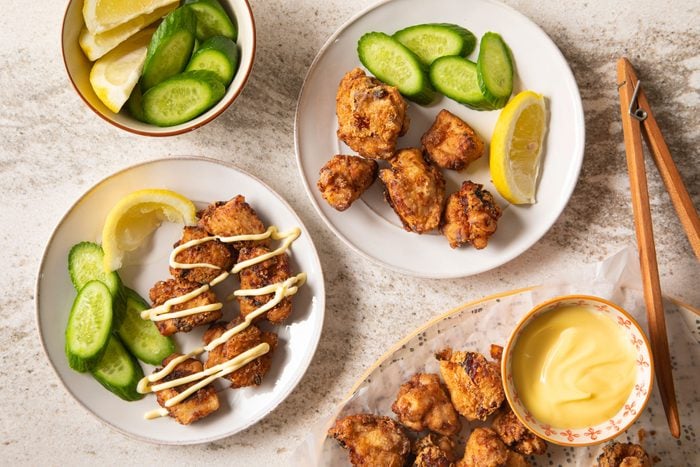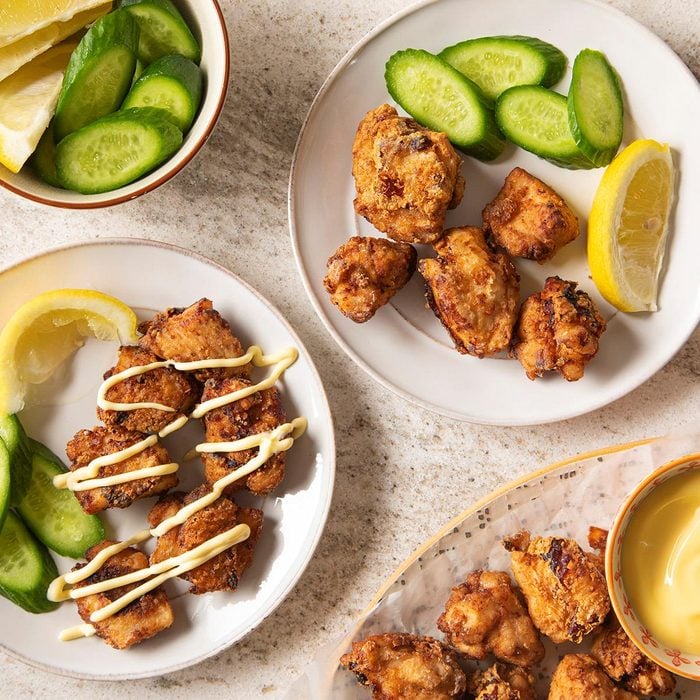The most satisfying part of fried chicken is the fact that it’s finger-lickin’ good, and this Asian version is no exception. Japanese fried chicken has a slightly sweet yet totally savory flavor because of the sake, soy sauce and mirin used in the marinade—three of the essential Japanese ingredients you need in your kitchen. Plus, the chicken is coated with cornstarch before being double-fried for a next-level crunch. Among all the Japanese chicken recipes we’ve tried, this might be our very favorite.
What is karaage?
Japanese fried chicken is also known as chicken karaage—this is the name of the cooking technique in which chicken, meat or fish is coated and then deep-fried in oil. While traditional fried chicken uses flour, karaage uses cornstarch. Karaage often involves a two-step deep-frying method, which helps get the skin crispy and brown quickly without risking overcooking the meat inside (read: it’ll still be tender and juicy when you bite into it).
While this might remind you of chicken katsu, there are a couple differences: Katsu is coated in panko bread crumbs instead of cornstarch and the cut of chicken typically used is boneless, skinless chicken breasts versus skin-on thighs.
Japanese Fried Chicken Ingredients
- Bone-in chicken thighs
- Sake
- Soy sauce
- Mirin (sweet rice wine)
- Fresh ginger root
- Cornstarch
- Oil for deep-fat frying
Directions
Step 1: Debone and prepare chicken
Remove bones from chicken, leaving the skin on. Cut chicken into 1-1/2-inch pieces. In a shallow dish, combine sake, soy sauce, mirin and ginger. Add chicken and turn to coat. Cover and refrigerate for 30 minutes. Drain chicken, discarding the marinade.
Step 2: Fry the thighs
In a deep fryer or electric skillet, heat 2 inches of oil to 325°F. Place cornstarch in a shallow dish. Add chicken, a few pieces at a time, and toss to coat; shake off excess. Fry chicken, a few pieces at a time, just until golden brown, about 1-1/2 minutes. Drain on paper towels.
Step 3: Fry them again
Increase the heat of the oil to 350°. Use a metal fine mesh strainer to remove any fried bits from oil. Fry the chicken thighs again, a few pieces at a time, until dark golden brown, about 1 minute. Drain on paper towels. If desired, serve with mayonnaise.
Japanese Fried Chicken Tips

What kind of oil is best for making Japanese fried chicken?
Always use oils with a high smoke point—the temperature at which oil will burn and produce smoke, negatively impacting the flavor—when frying. Your best bets include vegetable, sunflower or peanut oil.
What can you use instead of cornstarch?
Pure cornstarch is naturally gluten-free, so most everyone should be able to cook with this ingredient. However, if you don’t have cornstarch on hand and are craving Japanese fried chicken, you can substitute it with potato starch, rice flour or even all-purpose flour.
How can you replace mirin in this karaage recipe?
Mirin is a sweetened Japanese rice wine that’s similar to sake but has more sugar and a lower alcohol content. If you can’t find it or have run out, try substituting with sake, dry sherry, rice vinegar or dry white wine instead.
How can you make sure the Japanese fried chicken is juicy?
The simple act of frying it twice should do the trick, but it’s also important to keep an eye on the temperate of your fry oil. If the temperature is too high, your chicken thighs will burn on the outside before the meat inside is cooked through. During your first fry, the goal is to cook the chicken most of the way through; the second fry is just to crisp up the skin. Make sure the chicken pieces are cut into equal sizes, so they cook evenly.
How can you keep the chicken warm while you double fry?
While the chicken thighs rest between the two frys, they will continue to cook all the way through. There’s nothing special you need to do to protect them in between steps.
What do you serve with Japanese fried chicken?
Serve karaage with a bowl of rice and fresh-sliced cucumber for a little brightness, then garnish with Kewpie mayo. If you can’t find Kewpie mayo in the grocery store, it’s easy enough to make your own Japanese mayo, which is creamier, richer and slightly more sweet in flavor than regular mayonnaise.

